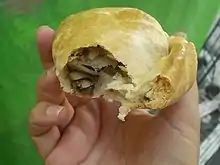paste
See also: Paste, pasté, pastę, paște, and Paște
English
Etymology
From Middle English paste, from Old French paste (modern pâte), from Late Latin pasta, from Ancient Greek πάστα (pásta). Doublet of pasta and patty.
Pronunciation
- IPA(key): /peɪst/
Audio (US) (file) - Rhymes: -eɪst
- Homophone: paced
Noun
paste (countable and uncountable, plural pastes)
- A soft moist mixture, in particular:
- One of flour, fat, or similar ingredients used in making pastry.
- (obsolete) Pastry.
- 1860, Charles Dickens, Captain Murderer
- And that day month, he had the paste rolled out, and cut the fair twin's head off, and chopped her in pieces, and peppered her, and salted her, and put her in the pie, and sent it to the baker's, and ate it all, and picked the bones.
- 1860, Charles Dickens, Captain Murderer
- One of pounded foods, such as fish paste, liver paste, or tomato paste.
- One used as an adhesive, especially for putting up wallpapers, etc.
- (physics) A substance that behaves as a solid until a sufficiently large load or stress is applied, at which point it flows like a fluid
- A hard lead-containing glass, or an artificial gemstone made from this glass.
- (obsolete) Pasta.
- 1766, Tobias George Smollett, Travels through France and Italy: Containing observations on character, customs, religion, government, police, commerce, arts, and antiquities. With a particular description of the town, territory, and climate of Nice. To which is added, A register of the weather, kept during a residence of eighteen months in that city, Volume 2 (travel), page 35:
- This is likewise the market for their oil, and the paste called macaroni, of which they make a good quantity.
- 1792, Arnaud Berquin, The childrens' companion: or, entertaining instructor for the youth of both sexes; designed, to excite attention and inculcate virtue. Selected from the works of Berquin, Genlis, Day, and others, pages 346:
- Vermicelli for soups, is paste from Italy; so called because it looks like worms. My macaroni, paste from Italy—My salop, a root ground to powder—the root of one kind of orchis.
-
- (mineralogy) The mineral substance in which other minerals are embedded.
Derived terms
- alimentary paste
- almond paste
- anchovy paste
- bloater paste
- cocaine paste
- curry paste
- diamond paste
- fishpaste
- German paste
- heat paste
- huf paste
- impaste
- library paste
- London paste
- pasteboard
- paste bomb
- pastedown
- paste egg
- paste-horn
- pasteless
- pasteup
- peanut paste
- phosphorous paste
- pouf paste
- puff paste
- razor paste
- softpaste
- spackling paste
- stone paste
- sugar paste
- thermal paste
- tomato paste
- toothpaste
- Vienna paste
- wheat paste
Descendants
- → Cebuano: pasta
Translations
a soft mixture
|
soft mixture used in making pastry
|
soft mixture of pounded foods
|
an adhesive paste
|
lead-containing glass, or an artificial gemstone thereof
|
mineral substance in which other minerals are embedded
|
Verb
paste (third-person singular simple present pastes, present participle pasting, simple past and past participle pasted)
- (transitive) To stick with paste; to cause to adhere by or as if by paste.
- (transitive, computing) To insert a piece of media (e.g. text, picture, audio, video) previously copied or cut from somewhere else.
- (transitive, slang) To strike or beat someone or something.
- 1943, William Saroyan, The Human Comedy, chapter 23,
- He got up and pasted Byfield in the mouth.
- 1943, William Saroyan, The Human Comedy, chapter 23,
- (transitive, slang) To defeat decisively or by a large margin.
Derived terms
- copy-paste
- paster
- paste up
- repaste
Translations
to cause to stick, adhere
|
to insert a piece of text
|
Anagrams
- Pesta, aspet, pates, peats, pâtés, sepat, septa, septa-, spate, speat, stape, tapes, tepas
Czech
Pronunciation
- IPA(key): [ˈpastɛ]
Verb
paste
- second-person plural imperative of pást
Dutch
Pronunciation
Audio (file)
Verb
paste
- singular past indicative and subjunctive of passen
Italian
Pronunciation
- IPA(key): /ˈpa.ste/
- Rhymes: -aste
- Hyphenation: pà‧ste
Noun
paste f pl
- plural of pasta
Anagrams
- pesta, spate
Latin
Pronunciation
- (Classical) IPA(key): /ˈpaːs.te/, [ˈpäːs̠t̪ɛ]
- (Ecclesiastical) IPA(key): /ˈpas.te/, [ˈpäst̪e]
Participle
pāste
- vocative masculine singular of pāstus (“fed, nourished; having eaten, consumed; grazed, pastured; satisfied, gratified”)
Old French
Etymology
From Late Latin pasta, from Ancient Greek πάστα (pásta).
Noun
paste m (oblique plural pastes, nominative singular pastes, nominative plural paste)
- dough; paste
- pastry
Derived terms
- pastaierie
Descendants
- Middle French: paste
- French: pâte
- → Middle English: paste
- English: paste
- → Cebuano: pasta
- Scots: paste, paist
- English: paste
References
- paste on the Anglo-Norman On-Line Hub
Portuguese
Verb
paste
- inflection of pastar:
- first/third-person singular present subjunctive
- third-person singular imperative
Spanish

paste from Mexico City
Pronunciation
- IPA(key): /ˈpaste/ [ˈpas.t̪e]
- Rhymes: -aste
- Syllabification: pas‧te
Etymology 1
(This etymology is missing or incomplete. Please add to it, or discuss it at the Etymology scriptorium.)
Noun
paste m (plural pastes)
- (Mexico) pasty, pastie (a type of pie or turnover)
- loofah (plant in the Luffa genus)
Alternative forms
- (loofah): paxte
Etymology 2
See the etymology of the corresponding lemma form.
Verb
paste
- inflection of pastar:
- first/third-person singular present subjunctive
- third-person singular imperative
Further reading
- “paste”, in Diccionario de la lengua española, Vigésima tercera edición, Real Academia Española, 2014